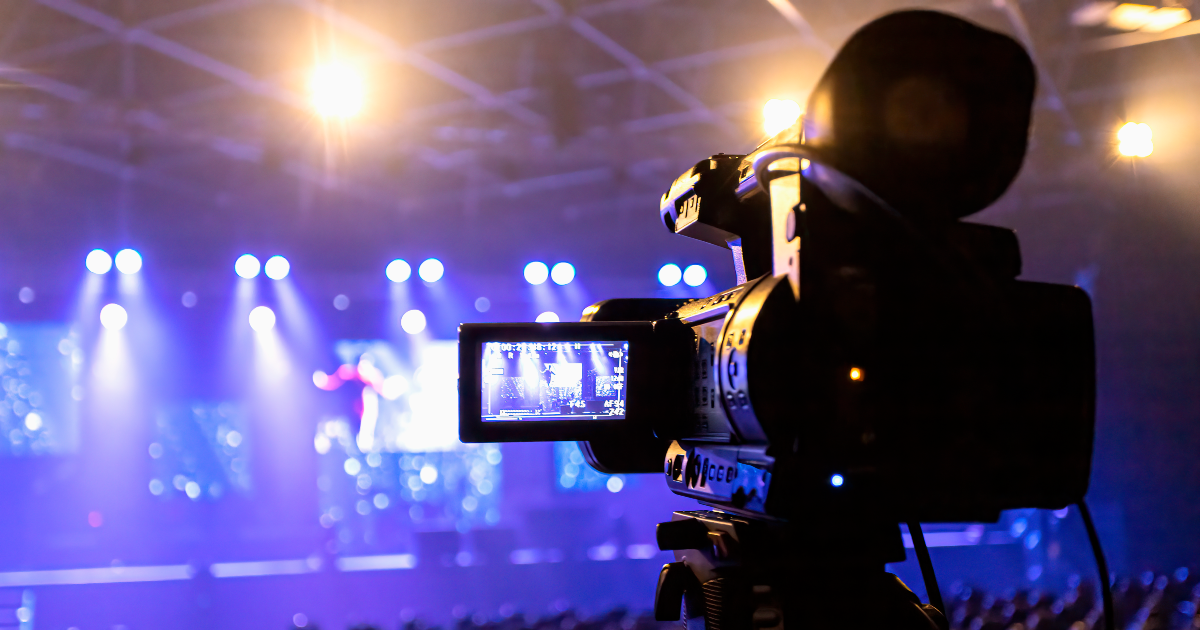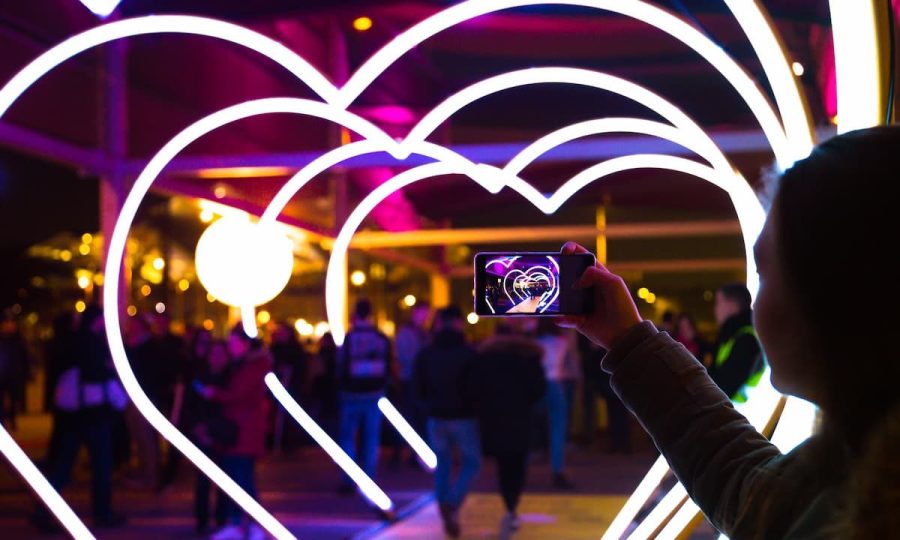Step into the future of event planning, where technology developments in the hospitality industry play a crucial role in creating extraordinary experiences and event technology have a profound impact on conferences and event management.
Whether you want to become an event planner or want to brush up on your hospitality knowledge, this comprehensive guide reveals the latest event trends and technology and showcases innovative platforms that can enhance your event planning skills.
What is event technology?
Event technology refers to the use of digital solutions and tools that improve every aspect of events, starting from the planning phase up until attendee engagement and beyond. This includes various technologies that an event organizer can use, such as virtual event tech, chatbots powered by artificial intelligence, RFID (radio frequency identification) wristbands, and augmented reality (AR).
Customized software such as event management platforms can also help streamline the process by simplifying planning and logistics. New event tech can be applied to all kinds of gatherings, from social gatherings such as weddings to corporate events.
Benefits of event technology
Modern advancements bring a huge range of compelling advantages to event planners. Technologies can help with:
- Increased efficiency: technology speeds up tasks, from guest list management to site selection
- Better networking: AI-driven matchmaking can facilitate valuable connections
- Boosted engagement: polling apps and live chat create real-time interaction
- Accurate analytics: Software platforms offer valuable data insights for better user experiences
- Reduced carbon footprint: online events or hybrid events both reduce travel, lowering environmental impact
- Scalability: digital tools open events to global audiences, helping you maximize guests from around the world.
Types of event technology
The evolution of event technology has created a diverse digital landscape for professionals in the field. Below, we take a look at some of the advances and their potential effects on event management.
Event apps
Modern events rely on apps for streamlined agendas, networking, and resource sharing. They can help event organizers manage schedules, facilitate connections, and share essential information. They can be web or mobile-based and can also help give staff and guests access to what they need on the go.
Livestreaming
A dynamic tool that serves remote audiences, this enables real-time interaction and engagement. Its use is on the rise due to the global shift toward virtual experiences.
Social media
Beyond personal use, social platforms can extend event reach by facilitating discussions and trending topics, increasing exposure and engagement among a wider audience.
Facial recognition
Rapid check-in and heightened security are increasingly being achieved through facial recognition technology. As well as being used for registrations, facial recognition can be used to link accounts to personal profiles, which helps validate spending at the event.
Augmented reality (AR)
Incorporating virtual elements in the real-world event space, AR boosts event interactivity by delivering unique experiences, valuable data insights, and improved event navigation. AR can add another dimension to an event and enliven an experience for attendees. It can also encourage event gamification, adding excitement and fun for lasting impact.
Virtual reality (VR)
VR can transport attendees to new environments, expanding event boundaries by offering immersive experiences that go beyond the physical realm. The use of VR in the event industry is expanding the scope of digital events considerably.
Artificial intelligence (AI)
AI optimizes event operations through data analysis, from predicting attendee behavior to automating part of the customer service experience, driving efficiency, and improving the personalized support that guests get at the event by taking their unique profile into account.
RFID (radio frequency identification) tags
RFID tags are an exciting piece of wearable technology an event organizer can use. They improve efficiency in entrance flow, payment processes, and visitor tracking, streamlining event operations for a better overall user experience.
If you’re looking for a career in event management and technology using all of these new advances, you should consider studying for a degree in hospitality. This will help you become familiar with how to plan and manage an event as well as help you get industry connections and stay up to date with technology.
With expert teaching from industry leaders and opportunities to find mentorship and gain experience, our Master’s can help launch your event planning career.

Key considerations when choosing event technology
Technology is now an essential element of successful event management. When selecting the right tech, several key aspects require attention to make sure you make the right choices. We discuss the main considerations you need to make as an event manager below.
Costs and budgeting
Evaluate costs against your budget. Prioritize essential functions, exploring cost-effective alternatives while accounting for long-term expenses such as support and updates. Use revenue management strategies to see how much you can put into new technology for events and what delivers the best ROI.
Scalability and flexibility
Choose tech that can seamlessly adapt to changing attendee numbers and can scale with your event as it grows. Virtual event tech with scalable options opens doors to wider possibilities. This is particularly important if you are expecting to host larger events in the future.
Security and privacy
Prioritize stringent security measures and data privacy, especially in the face of rising cyber threats and privacy regulations. Protect against breaches and respect attendees’ privacy rights by making sure that you have stringent cyber security in place to prevent any hacking attempts. It’s also vital to make sure that you do not gather unnecessary information about your guests, which could be used if the data is stolen.
User experience and design
Ensure user-friendly design for attendee satisfaction. Picking the right technology means picking something that tech-savvy and less tech-comfortable guests can use. The systems you choose should also be easy enough for all event staff to use without too much additional training.
Integrations and compatibility
Opt for tech that integrates well with existing systems such as registration software, session-tracking apps, and social media. Compatibility with diverse devices, operating systems, and browsers can also help boost engagement.
Event technology platforms and products
Choosing the right technology platforms to support your event is part of the formula for success. Some of the notable event technology platforms and products that dominate the industry are listed below.
Hopin
The Hopin platform was designed specifically for virtual events, providing an environment where participants can connect and network regardless of geographical limitations. Its features include interactive exhibitor tables/booths, virtual exposition spaces, and stages that mimic the experience at live venues.
ON24 platform
A favorite at technological events, the ON24 platform is a comprehensive solution tailored towards webinar-based activities. It boasts customizable environments and audience engagement tools such as polls and Q&A sessions, making it ideal for webinars needing that personal touch.
Webex events
No stranger to anyone connected with current events technology, Webex is a mature online event service from Cisco. Its strengths lie in its robust discount options for non-profits, strong security features and impressive scalability.
EventHub live
Focusing predominantly on trade shows and expos, EventHub live exemplifies how the physical atmosphere can be simulated virtually. The platform recreates exhibition booths digitally, allowing exhibitors to showcase their offerings while interacting directly with attendees through video chats.
Bizzabo event experience OS
The beauty of Bizzabo lies in its ability to handle hybrid events professionally. It blends both physical and digital components seamlessly, creating an amazing user experience regardless of where attendees are based.
Cvent attendee hub
An invaluable asset for delivering hospitality-related functions. From hotel block reservations to ticket registrations and even post-event reporting, Cvent attendee hub covers everything in one comprehensive package.
Fairs
This option is a master of virtual event tech by blending real-life conferences and 3D environments to enrich attendee experiences. It can also host webinars with simultaneous translation to address diverse language preferences among global attendees.
Cvent event management
In line with its sister product the attendee hub, Cvent event management is a multi-faceted, end-to-end solution for planners needing event management software. It aids smart goal attainment and yields resourceful tips aiding informed decisions.
Event technology trends and ideas
In a rapidly changing world, technology continues to present options that are transforming the way events are executed. Among the main trends to watch in this space include:
- Virtual event tech: with their use accelerated by pandemic-induced travel restrictions, virtual platforms are now a staple of the industry
- Mixed reality (MR) events: combining augmented and virtual realities for immersive experiences, MR events are gaining momentum
- AI-enhanced personalization: expect AI-driven personalization to boost attendee engagement by offering tailored content recommendations based on attendee preferences. Find out more about AI in the hospitality industry.
- Sustainability: environmental consciousness now integrates with event tech, as eco-friendly solutions such as green energy sourcing and digital ticketing gain traction. Sustainability in hospitality is a trend that’s here to stay
- Data-centric advances: comprehensive analytics provide insights into participant behavior, aiding event managers align their offer with attendee desires

How to maximize event technology use
The strategic deployment of event technology can elevate attendee experience while streamlining labor-intensive tasks. Below are guidelines on how to make optimum use of the relevant tech tools at your disposal.
Leverage a comprehensive platform
Engage with comprehensive platforms such as Cvent. These offer an all-in-one solution for event requirements such as registration, email marketing, attendee tracking and analytics provision. An integrated platform minimizes the risk of system incompatibility while maximizing efficiency.
Embrace flexibility with cloud-based tools
Consider cloud-based options for online event services to ensure accessibility and real-time updates across different sectors of your organization. The flexibility offered by these tools enables rapid scalability and can adapt quickly to event needs.
Make it interactive
Interactive features embedded in virtual event tech help encourage create engagement among attendees. Leverage functionalities such as live polling, Q&A sessions, or chat rooms to build a multi-dimensional and immersive event experience. This can help attendees feel more involved and help deliver a memorable event for every guest.
Upscale user experience with AI
Well-deployed AI can automate routine tasks and personalize user experiences based on individual preferences.
Ultimately, the key to maximizing event tech lies not just in the adoption but in adapting it to specific event needs and aspirations.
Event technologist: what is it and is it right for me?
Event technologists are special kinds of event planners, dedicated to optimizing tech for better experiences. They are experts in modern technology for events and their main tasks include:
- Implementing innovative event tech solutions
- Managing live streaming setups and software integrations
- Maintaining and troubleshooting virtual event tech
- Providing training on trends in conferences and event tech
This role suits tech enthusiasts passionate about transforming traditional approaches using digital tools. Adaptability to change and ongoing learning is crucial.
How to learn more about event planning and event technology
To learn more about event planning, you can start by taking online courses or enrolling in formal event planning programs offered by universities or colleges. If you are looking for a great degree course, you should try to find one that offers professional internships. A fruitful internship experience can help you learn from industry experts and get hands-on practice running events.
There are also numerous resources available online, including blogs, books, and YouTube channels dedicated to event planning tips and techniques. Consider attending workshops, seminars or networking sessions in the event planning industry to connect with professionals and gain hands-on experience. Additionally, interning or volunteering with event planning companies can provide valuable practical insights.
Body: Combining insights from industry leaders with exclusive opportunities to network and gain experience in prestigious work placements, this degree is the platform to transform your future.

Conclusion
In the rapidly changing field of event and hospitality technology, it is crucial to embrace innovation. With a wide range of event technology choices available, from virtual platforms to AI, making informed decisions is essential. Success in this area relies on adaptability, continuous learning and a dedication to improving attendee experiences. As we move forward, effectively integrating technology will continue to shape successful events. A great way of learning the essentials of event management and finding out about the technology available is to study at a renowned hospitality school such as Les Roches




